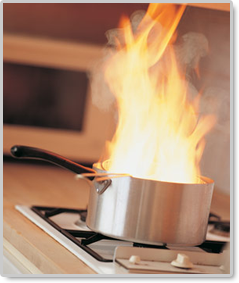Cooktop Fires: Critical DO's and DON'Ts

what to do if you have a stove fire, and
how you can prevent them in the first place.
Properly Handling Stove Fires
Never try to pick up a pan that is on fire. It’s all too easy to burn your hand and spill the contents of the pan, which will allow the fire to spread. NEVER pour water on a stove fire, especially if there is any grease, as this can cause the fire to explode into a fireball.
A small pan fire on your stove can usually be extinguished by turning off the heat and covering the pan with either its lid or a wet towel to smother the flames. You can also smother a small pan fire using baking soda, so it’s a good idea to keep baking soda handy near your stove. For larger fires, you will want to use a fire extinguisher. So be sure to keep a tested, UL-rated fire extinguisher easily accessible in your kitchen, and to be familiar with its instructions and how to use it in an emergency (see costs and reviews of kitchen-sized fire extinguishers).
Preventing Stove Fires
The best strategy for stove fires is to prevent them from occurring in the first place. Here are some tips to keep in mind for preventing stove fires in your home:
-
Never leave food unattended while cooking
. Even a few seconds is enough for a fire to break out, especially if you are cooking with fats such as oil, or sugar. -
When cooking with any oil at a high temperature, give your stove your full attention
. Grease, oils, and fats are the most common cause of stovetop fires. The hotter they get, the more dangerous they become. -
Avoid loose-fitting clothing, and tie back long hair when cooking at your stove.
-
Make sure the stove top is always clean and clear. Never leave wooden or plastic tools, dish towels, or other items on the stove top
. Take care to only turn on the burner you intend to use, to prevent igniting a fire in the wrong place. -
Clean your stove after each use to prevent spills that could later fire on the burners.
-
Clean under the burners regularly to prevent fires from excess food.
Cleaning the reflector pans under the burners also helps to maintain the energy efficiency of your stove.
Especially for Gas Stoves
If you have a gas stove, regularly check for gas leaks, and if you notice any stove parts getting rusty or old, be sure to get them replaced. Any time you smell gas, turn off your gas at the source, open windows, and quickly exit the house. Do NOT touch any electrical switches, and do NOT use a phone to call the Fire Department until you are outside your house. Switches and phones can emit tiny sparks that can ignite a gas cloud. Also, be sure the pilot on your stove lights immediately after you turn the gas on. An explosion can occur by waiting for more than even a second or two.
SUMMARY
We hope this article has helped you make your home safer by explaining what to do if you have a stove fire, and more importantly, how you can prevent stove fires from occurring.
Related Articles . . .
7 Things That Can EXPLODE in Your Home!
If your attitude towards home maintenance is I don't want to know about it, unless it will keep my house from blowing up! . . . then you will love this article and video.
Preventing the 5 Most Fatal Home Accidents
Home accidents cause more deaths each year than any other reason except for motor vehicle accidents. This article and video discuss steps you can take around your home to prevent the 5 leading causes of home accident deaths.
Why and How to Clean Your Smoke Detectors
To keep your smoke detectors operating properly, you should clean them at least every six months. This article explains why, and the easy steps you can take to clean your smoke detectors.
Home Improvements as You Get Older
As we get older, our eyesight, agility, and dexterity are all not what they were when we first moved into our home. This article describes some simple changes that you can make to your home to help keep it safe as you get older.
Microwave Safety Tips
A microwave is easy to use and a great time-saver, but it can also be a cause of burns, kitchen fires, and sickness from under-cooked foods. Here are 55 tips for operating your microwave safely.
Refrigerator Tips for Saving Energy & Food Safety
Your refrigerator is the fourth largest consumer of energy in most homes. This article and video gives you tips for reducing your refrigerator's energy use, and will also help you ensure food safety.










